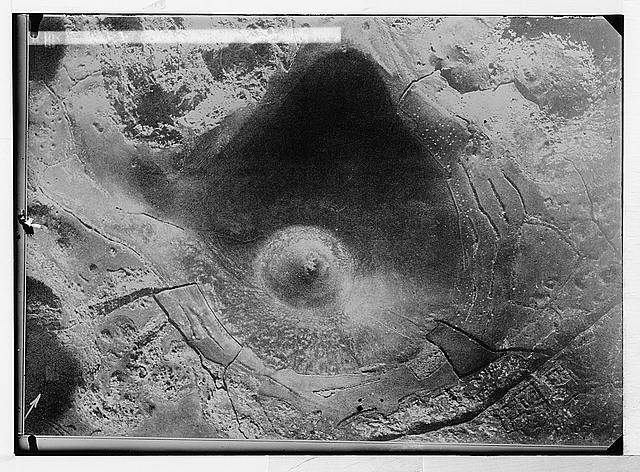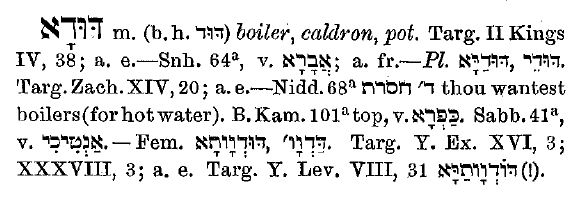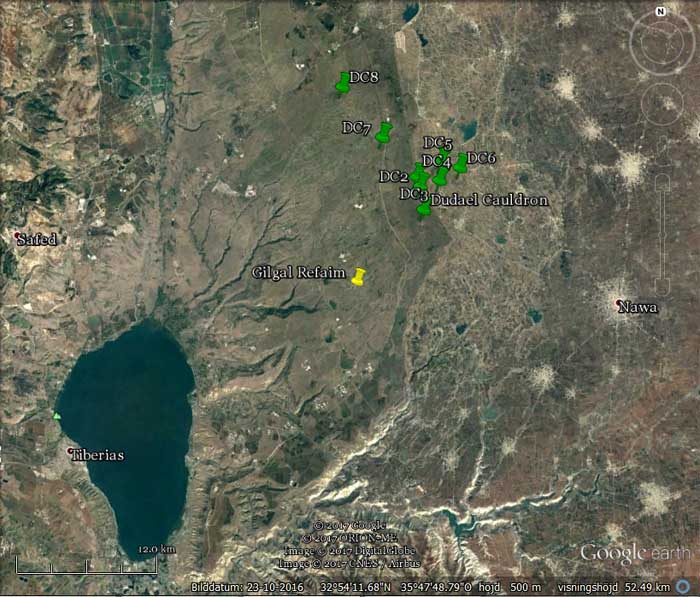Checking out the name Dudael, or Duda'El
One meaning of Duda, is "dud" (Strong's H1731):
dôd, From an unused root meaning properly to boil,
dûd, From the same as H1730; a pot (for boiling); also (by resemblance of shape) a basket: - basket, caldron, kettle, (seething) pot.
From the books of Moses, it can be concluded that Dudael must be placed to the east of Israel. To the east of Israel, and there also has to be a connection to Mt. Hermon, is an area that were called Bashan, which was a vulcanic area, with many craters. In or nearby Bashan was also Hauran, or Chauran.
"The name Chauran probably means "hollow land." (International Standard Bible Encyclopedia).
"The land of Bashan is characterized by its volcanic formation: the hills have craters..." (jewishencyclopedia).
The arabic word for boil is damal.
In the western part of the volcanic plateu Hauran, is a small city called Dael.
"Da'el (Arabic: داعل, also spelled Da'il) is a town in southern Syria located on the old road between Daraa and Damascus, located approximately 14 kilometers north of Daraa. Administratively, it belongs to the Daraa District of the Daraa Governorate and is the center of the Da'el nahiyah ("subdistrict")" (Eng. Wikip.)

"Series of first aerial photographs of Palestine and Syria. Volcano and crater in the Hauran Mountain - Date Created/Published: [approximately 1900 to 1920] - Library of Congress, Prints & Photographs Division, Matson (G. Eric and Edith) Photograph Collection - Reproduction number: LC-DIG-matpc-05598 (digital file from original photo) - Rights Advisory: No known restrictions on publication"
Note the frequency of the letters "Da" in those place names, all located to the east of Israel, in or very nearby Bashan, and Mt. Hermon.
Here are some likely connections, but are they convincing, do they prove that Duda'El was an old name for Bashan, or the area round about Bashan, east of Israel?
It seems to be at least probable, from the information above.
Dudael is spelled Dadouel in the Greek Gizeh-text of Enoch. Dadou is a common arabic name.
L, S, and C all translate the Eth. like this "the desert, which is in Dudael", but at least the greek word "en" can, besides "in", also mean "by" or "at". So there was a desert, or wilderness, a deserted area, in or nearby a place called something like Dudael.
And Duda'El could have had the meaning "Craters of God" (a volcanic landscape), or a hollow area like that in Hauran.
All of this makes it, as said, at least possible that the burial site of Azazel was in Bashan, and more precisely, where there is an ancient site which has all the traits of which Azazel's grave is described with: the Gilgal Refaim, built of rocky, unhewn stones, and with a seal, yes a TIME-seal, according to Hebrew archaeologists, much like Stonehenge and other similarly old sites.
And to add to that is, that the Bashan area of old has been connected with death, tombs, and Hades, as also the Gamla megalithic site shows, where there are many "giant graves", and over all, the whole area round about Gilgal Refaim is littered with old cultic traits, as if the circle really was a hub of a huge, ancient grave-yard. And all of this was of cource known to the Israelites, and those who translated the Book of Enoch to Aramaic and Greek. It is not very likely that they missed the connections, which are even displayed in the NT, with the Legion of demons inhabiting a couple of men Jesus and the disciples met in the area.

Looking at a satellite map of this area, it really looks like the entrance to hell, specially when looking at a huge, what must be a crater, shortly to the east of Hauran, dark to its color. Perhaps that may have been the "Caldron of God" to the ancients. It reminds of something out of where Hobo and his fellows passed.
...
Further on:

דודא (A-D-W-D in Aramaic = Duda!) (Jastrow, Dictionary of the Targum).
A note
Some have assumed that with the expression “Cauldron of God”, is meant the abyss, where the descended angels were imprisoned. But THAT IS NOT WHAT THE TEXT IN ENOCH SAYS. It says, “make an opening in the desert that is in (or by or at) Dudael”. So, Dudael is not the opening, or the prison. Dudael is the area, within which there is a desert, where the angel of God were to make an opening to imprison Azazel.
This then is perfectly in line with the above, and those geographical details mentioned. Bashan, with its volcanic many cauldrons/craters, which for the ancients would have been seen as boiling (if they were still active) kettels, of the gods, making the name Duda'El the perfect and most natural description thinkable.
Duda'El – the landscape of big (mighty) cauldrons.
___

This is not done on purpose. I got the idea to look in Google Earth for volcanic hills in the Golan Heights and the surrounding areas, to see if I would find confirmation for my localization of Dudael. I would have been happy to find such hills spread around the whole area, it would have been enough to think that ancient people would have designated the area as a "duda'El". But what I found was much clearer than that. It seems that just to the nort-east of Gilgal Refaim, there is a concentration of volcanic hills, with craters. I've marked 8 of them on this image, but there are probably a few more, smaller, in the same area. With this image in mind, now let's read Enoch 10:4-5:"And again the Lord said to Raphael: 'Bind Azazel hand and foot, and cast him into the darkness: and make an opening in the desert, which is in [or by, or at] Dudael, and cast him therein.
And place upon him rough and jagged rocks, and cover him with darkness, and let him abide there for ever, and cover his face that he may not see the light." (Enoch, Charles trsl.)
___